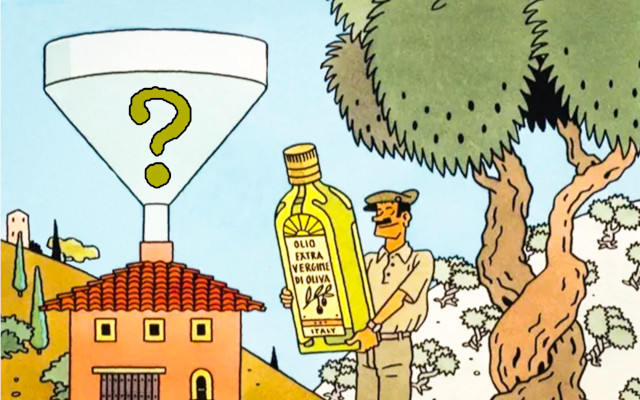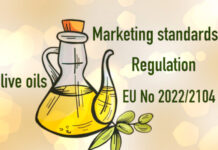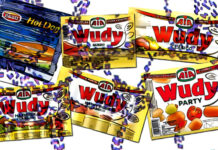A high-level controversy erupted in Spain between November and December 2024, following the denunciation of widespread food fraud in the olive oil sector by its largest producer in the world.
The results of the analyses carried out by consumer associations on various samples of extra virgin olive oil, marketed in France and Spain, are also discordant. An in-depth analysis.
1) Food fraud on olive oil in Spain. The leader’s complaint
The world’s leading producer of olive oil, the Andalusian cooperative Dcoop, has denounced the recurrence in Spain of widespread fraud on refined olive oils. Which, according to the vibrant accusation, would be in some cases mixed with lower value oils such as pomace and sunflower.
‘We have been silent for 40 years, but we won’t allow it anymore‘, said Dcoop president Antonio Luque in a meeting with the media. He called on national and regional administrations to investigate traceability, given ‘very solid evidence‘.
The general director of Dcoop, Rafael Sánchez, has also reiterated that ‘it is time to put an end to this situation and ‘clean up the image of this product to exercise the leadership that Spain deserves‘ in the olive oil sector (1,2).
2) Reactions of the minister and trade associations
The Spanish Minister of Agriculture, Fisheries and Food, Luis Planas, has defined Dcoop’s references to widespread food fraud as ‘irresponsible and unfortunate‘, affirming instead the effectiveness of controls on the labelling and organoleptic characteristics of olive oils. (3)
The trade associations ANIERAC (Asociación Nacional de Industriales Envasadores y Refinadores de Aceites Comestibles) and ASOLIVA (Asociación Española de la Industria y el Comercio Exportador del Aceite de Oliva) also defended themselves, referring to compliance with current legislation. (4)
Spain, it should be remembered, is the world’s leading exporter of olive oil and is expected to produce 1.26 million tonnes in the 2024-2025 campaign. Spanish olive oil exports reached 750,000 tonnes last year, for a value of around 6 billion euros. (4)
3) Extra virgin olive oil, Spanish consumer analysis
The Spanish consumer association OCU (Organización de Consumidores y Usuarios) has subsequently published the results of its latest market research with analyses of 23 references of extra virgin olive oil available in supermarkets.
For the first time since 2017, the results of the analyses have been completely favourable, in the sense of confirming that all the products analysed are ‘truly extra virgin‘. Also confirming the quality of many private-label products (private-label).
The Andalusian cooperative Oleoestepa has produced – under its own brand, Auchan organic line (Alcampo) and Mercadona (Hacendado) – the three oils awarded with the best quality scores. Followed by 10 Carrefour, La Española, Urzante, Eroski, Mar de Olivos, Coosur-Acesur organic and Consum.
4) France, the survey of ’60 million consumers’
The independent magazine ’60 Millions de consommateurs’ – in an investigation into olive oils on supermarket shelves in France, prior to the Spanish controversy – on the contrary showed an unsatisfactory situation, with serious suspicions of food fraud. (6)
INC (Institute Nationale de la Consommation), the magazine’s publisher, has therefore denounced that the owners of several brands – some of which are very popular among consumers – have ‘marketed olive oil as an extra virgin without respecting the quality criteria required for this denomination‘. (7)
The brands indicted are Naturalia Like a Virgin, La Vie Claire, Cauvin La Bio, Terra Delyssa, Simplemente bon et bio, Bio Village and Carapelli extravergine classico. ‘Dubious blends, poor conservation and unscrupulous production processes‘ that affect the taste of the product and ‘reduce its nutritional properties‘.
5) Ancient frauds and modern technologies
Food fraud in the olive oil sector has been documented since the times of the Roman Empire, where such conduct was severely punished. And it has continued into modern times, to the point that in the 1990s the then European Economic Community (now the European Union) established an ‘olive oil task force’ within the anti-fraud authority OLAF.
The European Union has recently updated the marketing standards and harmonised methods for chemical and organoleptic analyses that Member States must apply in official controls to verify the conformity of different types of olive oils (7,3,8). However, food fraud does not have a uniform regulation within the single market. (9)
6) Future prospects
‘The Blockchain offers one of the best traceability techniques that increases customer confidence in the food products they purchase and can help develop a well-founded food fraud prevention strategy‘. (10)
Recording of material flows and analyses on individual production batches with blockchain technology, even open access, could significantly reduce the risk of food fraud. (11) When?
Dario Dongo
Credit cover: Tom Mueller. Slippery Business, The trade in adulterated olive oil. Illustration by Joost Swarte. The New Yorker. August 6, 2007 https://tinyurl.com/fx3jdmay
Footnote
(1) Javier García Ropero. The world’s largest oil producer reports fraud in refined oils sold in Spain as “olive oil”. El País. 11/27/24 https://tinyurl.com/yva4s7f4
(2) Dcoop denounces fraud in olive oil and calls on the Administrations to investigate it. Europa Press. 27.11.24 https://tinyurl.com/x9y58w27
(3) Official controls on the compliance of olive oils are subject to identical rules in all EU Member States. See Dario Dongo, Giulia Pietrollini. Olive oils, compliance checks. Reg. EU 2022/2105. FT (Food Times). December 11, 2022
(4) Belén Delgado. Planas criticizes Dcoop for putting the reputation of olive oil “into question”. Efeagro. 28.11.24 https://tinyurl.com/yn3v52cj
(5) Paula Clemente. The crisis surrounding olive oil has taken its quality to the extreme: for the first time in 17 years, the OCU has not detected any non-compliance. El Periódico. 28.12.24 https://tinyurl.com/27jjpep3
(6) Seven brands of extra virgin olive oil questioned by an investigation in France. El diario basco. 11.12.24 https://tinyurl.com/4z5czjpw
(7) The marketing standards applicable to the different olive oils are now regulated by Regulation (EU) 2022/2104. See Dario Dongo, Andrea Adelmo Della Penna. Olive oil, new purity characteristics. GIFT (Great Italian Food Trade).
(8) Dario Dongo. Official controls and analysis methods in the EU, the ‘cascade principle’. FT (Food Times). October 20, 2024
(9) Dario Dongo, Giulia Baldelli. Food fraud, an unsolved problem. ‘EU Food Fraud Network’ report. FT (Food Times). April 30, 2019
(10) Richard Kwasi Bannor, Kingsley Kofi Arthur, Dixon Oppong, Helena Oppong-Kyeremeh. A comprehensive systematic review and bibliometric analysis of food fraud from a global perspective. Journal of Agriculture and Food Research, Volume 14, 2023, 100686. ISSN 2666-1543, https://doi.org/10.1016/j.jafr.2023.100686
(11) Dario Dongo. Agri-food blockchain, from Walmart to the FDA in the USA, Wiise Chain in Italy. To the Web 3. GIFT (Great Italian Food Trade).
Dario Dongo, lawyer and journalist, PhD in international food law, founder of WIISE (FARE - GIFT - Food Times) and Égalité.








